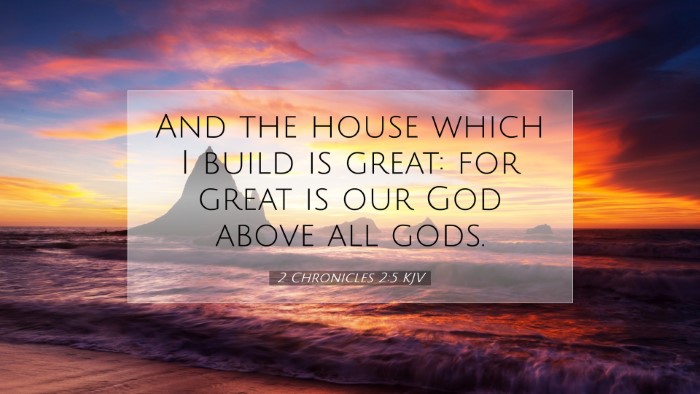Commentary on 2 Chronicles 2:5
Scripture Reference: 2 Chronicles 2:5 - "And the house which I build is great: for great is our God above all gods."
Introduction
This verse offers a profound insight into the character of God as perceived by King Solomon during the preparations to construct the Temple in Jerusalem. The verse highlights not only the magnitude of the structure Solomon intends to build but also the greatness of God Himself. This commentary draws insights from public domain sources such as Matthew Henry, Albert Barnes, and Adam Clarke to provide a comprehensive understanding of this passage.
Background Context
The context of this chapter reflects Solomon's undertaking to build the Temple, fulfilling his father David’s desire to create a dwelling for the Lord. This temple was to be a significant architectural feat, symbolizing God's dwelling among His people and serving as a pivotal place of worship in Israel.
Historical Significance
Henry emphasizes that this effort provides a glimpse into the early stages of Solomon's reign, characterized by wisdom and a desire to honor God. The construction of the temple represented a shift in Israel's history, moving from a nomadic existence to establishing a permanent dwelling for God.
Analysis of the Verse
The Greatness of the House
Solomon's declaration that "the house which I build is great" carries several implications:
- Architectural Grandeur: The anticipated scale and grandeur of the Temple surpass any previous structure. According to Barnes, Solomon aimed to construct a building that mirrored the greatness of God.
- Spiritual Significance: As Clarke points out, the greatness of the Temple extends beyond physical dimensions; it represents the spiritual significance of God's presence among His people.
- Symbol of Unity: This temple would serve as a central place of worship, uniting the tribes of Israel and reinforcing their identity as God’s chosen people.
The Greatness of God
Solomon states, "for great is our God above all gods," which leads to several reflections on God's superiority:
- Monotheism vs. Polytheism: By acknowledging the greatness of God above all other gods, Solomon distinguished the God of Israel from the deities worshipped by surrounding nations. This contrasts the worship of a singular, omnipotent God with the pagan practices of polytheism, as noted by Henry.
- Theological Implications: The phrase underscores the theological conviction that God is not only powerful but also sovereign over all creation. Clarke elaborates on how this recognition is vital for Israel’s national identity and their covenant relationship with God.
- Invitation to Reverence: The greatness of God invites a response of reverence and worship. Solomon’s understanding of God’s nature set the tone for the worship that was to occur within the Temple’s walls.
Lessons for Today
This verse remains relevant for modern believers in several ways:
- Understanding God's Greatness: Just as Solomon emphasized the greatness of God, contemporary believers are called to recognize and celebrate God's supremacy in their lives and communities.
- Building for God's Glory: The construction of the Temple serves as an analogy for the importance of establishing spaces that honor God—this can be physical spaces like churches or metaphorical spaces in our lives.
- Unity in Worship: The Temple acted as a unifying element for the people of Israel. Today, local churches and gatherings serve a similar purpose in fostering community and shared faith.
Conclusion
In summary, 2 Chronicles 2:5 encapsulates Solomon's intentions to build a grand temple dedicated to the worship of the one true God. This commentary has drawn from the insights of Matthew Henry, Albert Barnes, and Adam Clarke to highlight the theological depth of the text. As pastors, students, and scholars reflect on this verse, they are reminded of the importance of acknowledging God's greatness and the need to create spaces—both physical and spiritual—that are worthy of His presence.


